
Renowned Ouija historian/expert Robert Murch discusses his position as a consultant on the film Ouija, the history of talking boards and our mutual appreciation for 1986’s Witchboard.
Can you begin by tell us a little bit about yourself and what you do?
My name is Bob Murch. I mostly go by Murch. I’m considered the world’s foremost expert on Ouija and talking boards. I’ve spent more than two decades researching, writing, presenting, talking, doing anything I can do learn the real history behind the Ouija board, which is as interesting as all the stories.
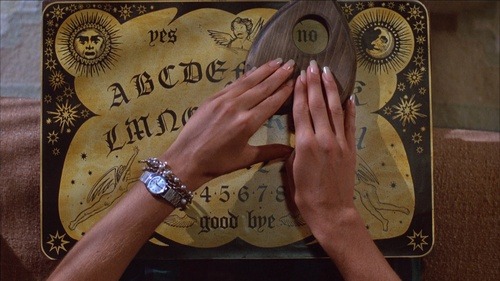
What is that drew you to the Ouija board in the first place?
Ouija boards are very unique. They’re one of the few toys or games that’s been sold in toy stores continuously for 125 years. What makes them special is they represent a key piece of people. We’re all gonna die. We all want to know what happens. Everyone experiences unexpected loss, someone dies and you never got say goodbye, never got to resolve that fight, to apologize - any of those things. The Ouija board, a flat surface with letters and numbers on it, represents a whole lot to people and what happens to people.
I saw Witchboard in 1986 and fell in love with it. I thought, “Wow, how can a game be so polarizing? How can some people be so afraid of it and think it’s so bad, and other people be so drawn to it?” I went to school at the University of New Hampshire, and three of my roommates decided to rush for a fraternity. I knew if I did that I wouldn’t graduate college, so I let them go to the fraternities and I could join the parties. Part of their rushing was a treasure hunt to find an old Ouija board, so I hit the flea markets. When I left UNH, I had 10 different Ouija boards. I thought, “How can that be? Isn’t there only one Ouija board?” And that set me off.
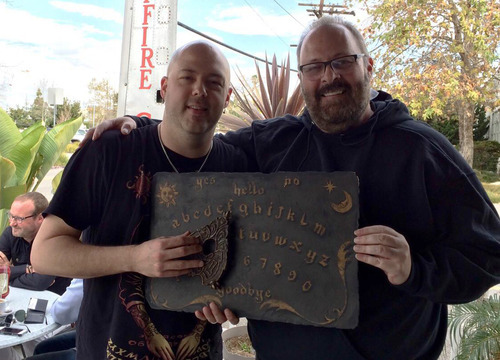
I really enjoy Witchboard. It received that great Blu-ray release last year, and people seem to be rediscovering it. What exactly drew you to that movie?
It was the first movie that had ever made a Ouija board or a talking board the main character. That’s what’s unique about taking boards: we give these boards a lot power. We don’t just look at them as a tool. People who build houses, they look at their hammer as a tool, but they don’t give it power; they use it. Yet when things start to happen with a Ouija board, we start to believe it, we give it the power. It takes on this life of its own.
[Writer/director] Kevin Tenney did a brilliant job. It was campy and it was the ‘80s, but it scared the hell out of us - and we loved it! That was just fantastic. After that movie, I thought, “Wow, there’s something here.” This simple idea has a lot of power because we believe it has power. It set me off on this two-decade life journey to find out where the Ouija board came from and hunt down the people who originated it and their descendents. I’ve been able to meet a lot of interesting people and rediscover a lot of the lost history working with a lot of other people, including how the Ouija board got its name.
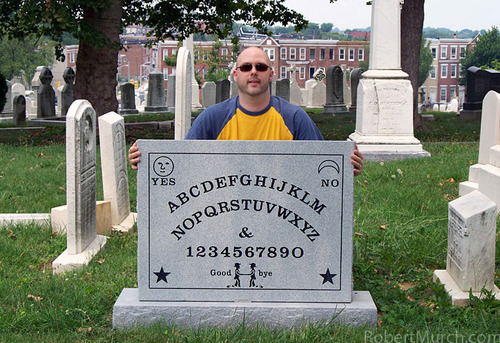
And how did it get its name?
Most of us through time believe that Ouija was the combination of two words: oui and ja, French and German. Yes, yes. A couple of years ago, I found some letters from the originators going back and forth about how the Ouija board came about. Of course, all their ideas are little different. They all make themselves a bigger part of the history, but they all agree on how it got its name.
It was April of 1890 at a boarding house in Baltimore, Maryland. Charles Kennard, the man who claims to invent the Ouija board, Elijah Bond, his friend who patented it, and his sister-in-law, Helen Peters, who’s considered a medium, sat at the board and asked it what it wanted to be called. It spelled out O-U-I-J-A. When they asked what that meant, the board answered, Good Luck. So it became Ouija: The Egyptian Luck Board. Why Egyptian? That was what Americans were seeing as mystical at the time. There were a lot of discovers at the Valley of the Kings at that time.
Charles Kennard wasn’t a hardcore believer. He understood that it was possible that this board of his might be working with your emotive response. It might be your subconscious that’s making this all happen. So he was watching the whole thing. As soon as the session is over, Helen Peters shows her necklace. It has a locket, and on the locket is a picture of a woman with the word Ouija. Charles says, “Were you thinking about that when we were playing?” She said, “No,” so they adopted the world. Today, we believe what she was wearing was actually a picture Ouida, who was a famous author at the time. Women who were well educated, had money and who believed other women should read may have been wearing things were her name on it. So Ouija may have actually been subconscious misspelling.
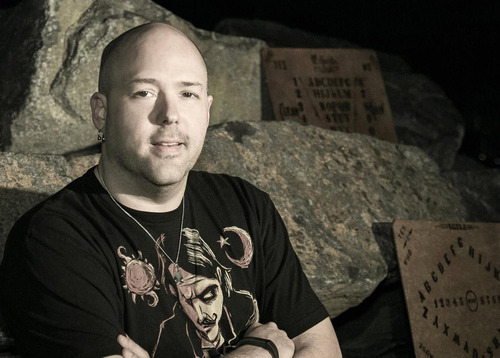
That’s fascinating. I never knew that. In all your years of experience, what’s the strangest thing you’ve experienced?
I’ve seen a lot of strange things. It depends on what you think is strange. A lot of people have a lot of stories. I personally have never seen the planchet move by itself, but you hear a lot of what we call “Ouija-stitions” - urban legends that have grown around 125 years of use. People will say that if you throw away the board, it comes back. Other people will say if you want to get rid of the board, you burn it or you bury it and put holy water on it. There’s lots of these stories and things that people believe. They start playing with them, they contact something that’s friendly at first and then it turns dark.
People often put their darkest fears and their worst imaginations as to what can happen on these boards. Most people forget that communication is going on between them and their subconscious, them and maybe some telepathy, them and maybe something else other than them, and that the board is just the telephone. The example I often like to say is, we’re on the phone right now and we’re having a conversation. We get into a fight, we call each other names, we say all these awful things to each other. When I hang up the phone, I’m not going to take my iPhone and throw it out the window and say, “I’ll never have another one of these in my house again.” But when it happens with a Ouija board, that’s what happens.
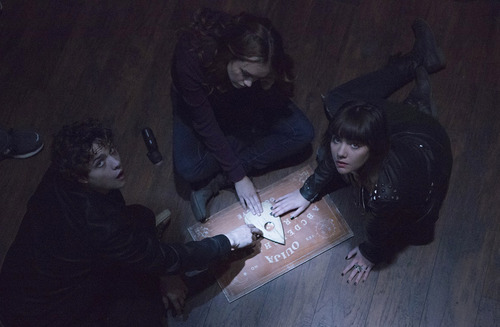
That’s a great way to put it. You recently served as a consultant on the film Ouija. What was that experience like?
It was pretty interesting. My involved started back in 2009. I came home from a party, and I was watching MTV and saw an interview with Brian Goldner, the CEO of Hasbro. He was talking about how Ouija was an untapped brand for Hasbro and that he wanted to make a movie out of it. I immediately emailed him, and he hooked me up Bennett Schneir, who’s one of the producers on the movie and at the time was the head of Hasbro Entertainment, which handles all the brands becoming films. We talked an awful lot about the history, what people believed, how that belief has changed, what’s happened over pop culture, and why people are so interested in it 125 years later. Through various scripts and different writers and directors, they finally settled on a couple of great people and the script was done. I kind of stepped back, and I got to see it in the end. It was pretty cool. They captured a lot of what people believed and are scared of with Ouija boards.
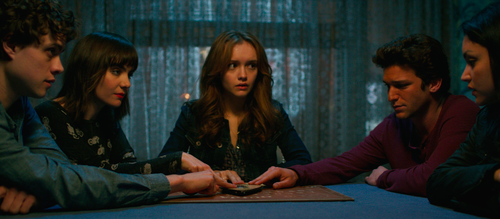
Other than a desire to be involved, what was your first thought when you heard they were making the movie?
I was psyched. Having tracked Ouija through its beginnings to today, a concern of mine was, where would Ouija fall in a digital world? All of us are using our iPads and our iPhones. We’re texting. Who’s going to want to sit down with a Ouija board? Movies are central to our beliefs about Ouija boards - why we believe and what we believe - so a movie completely about Ouija really puts it in the forefront of people today, which is exactly where it needs to be. I think it was perfect.
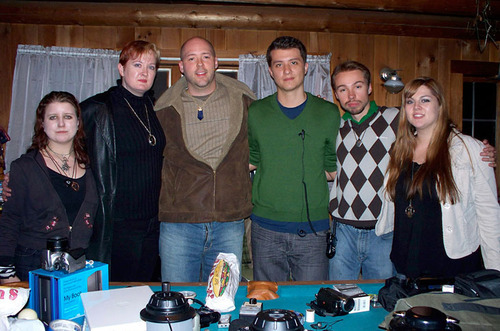
You’ve done similar work on other movies and TV. Could you tell us about some of those?
My first film that I ever got to consult was What Lies Beneath with Harrison Ford and Michelle Pfeiffer. It was an amazing experience. It was DreamWorks, and it was really cool. I got to be on set and teach everyone how to use it in the way that they wanted to use it. A lot of my work is showing people, depending on the scene or the tone, what are they trying to get across and how they want to do it. My experience on TV shows and movies, I’ve been really lucky to have those opportunities. The people couldn’t be nicer. They’re really interested in it, which is funny to me.
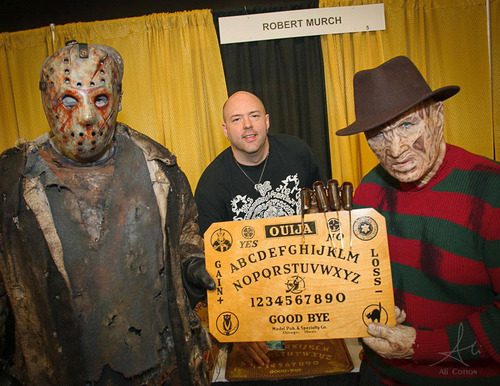
Do you ever find yourself shaking your head a movie’s inaccurate use of a Ouija board?
No. I keep a database for all movies, TV shows, music - every time a Ouija, talking/spirit board is ever mentioned, since it all started in 1986 to today. None of it bothers me, because the different beliefs that people have, it’s all part of that gambit. Whether it’s hilarious or just sad or whatever the movie is getting across, even if it’s a terrible movie, I always get excited to see a talking board no matter how it’s portrayed. People will believe what they want to believe any way. Seeing it kept in the forefront and being used is just a reminder at how we’re all connected through death.
execute-yourself-101 reblogged this from brokehorrorfan
 baby---squid reblogged this from brokehorrorfan
baby---squid reblogged this from brokehorrorfan southernsoulkeeperxx-blog reblogged this from brokehorrorfan
southernsoulkeeperxx-blog liked this
ghostofgraywalls liked this
ifearthenormal reblogged this from brokehorrorfan
ifearthenormal liked this
 savethedruginfluencedworld liked this
savethedruginfluencedworld liked this flamewhisker21 reblogged this from brokehorrorfan
flamewhisker21 liked this
lossuary liked this
 necrowemancer reblogged this from monstrum-dominae-blog
necrowemancer reblogged this from monstrum-dominae-blog yalptor reblogged this from horrorharbour
tinteatime liked this
monstrum-dominae-blog reblogged this from horrorharbour
alexislegend reblogged this from brokehorrorfan
andrewmcilwain liked this
ziemamergina liked this
vampyroslesboss reblogged this from brokehorrorfan
miss-arsenic liked this
seasons-in-hell liked this
thevvitch666 liked this
hopelessdinosaurs liked this
eletricspookaloo liked this
humanstein liked this
shaboogami liked this
yelah7 reblogged this from horrorharbour
rainbowsvomitwhat liked this
 bitches-superstition liked this
bitches-superstition liked this horrorharbour reblogged this from brokehorrorfan
horrorharbour liked this
blackcatarcade reblogged this from brokehorrorfan
siskotheque liked this
brokehorrorfan posted this

